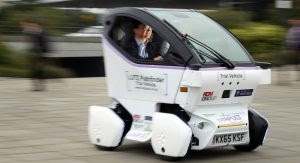Carried out on behalf of the UK government’s Department for Business, Innovation and Skills, the Lutz Pathfinder project was started 18 months ago to build and trial three automated pods within Milton Keynes, and assess their feasibility from both a technological and societal point of view.
 Designed and manufactured by Coventry-based firm RDM, the electric-powered two-seater pods are equipped with sensor and navigation technology initially provided by the University of Oxford’s Mobile Robotics Group, but with an open platform capability that will allow other Autonomous Control Systemsupplier
Designed and manufactured by Coventry-based firm RDM, the electric-powered two-seater pods are equipped with sensor and navigation technology initially provided by the University of Oxford’s Mobile Robotics Group, but with an open platform capability that will allow other Autonomous Control Systemsupplier to use the pods for trial purposes.
to use the pods for trial purposes.
The project was the first UK trial of automated vehicle technology in public pedestrianised spaces, using designated stretches agreed with our partners at Milton Keynes Council.
Self-driving vehicles equipped with autonomy software developed by the Oxford Robotics Institute (ORI) at the University of Oxford were tested in October in public for the first time in the UK.
The demonstration in Milton Keynes was coordinated by the Transport Systems Catapult (TSC) and marked the conclusion of the Lutz Pathfinder project, which has been running for the past 18 months.
The autonomy software running the vehicle, called Selenium, originated in Oxford University’s Oxford Robotics Institute with funding from the Engineering and Physical Sciences Research Council (EPSRC).
The vehicle autonomy software uses data from cameras and LIDAR systems to navigate its way around the environment. Selenium is being commercialised and was integrated onto an electric vehicle by Oxford University spinout company Oxbotica.
The vehicle demonstration took place on pavements around Milton Keynes train station and business district. In thefuture, it is expected that vehicles like those demonstrated in Milton Keynes will be used for local transportation in urban areas.
Comments
Post a Comment